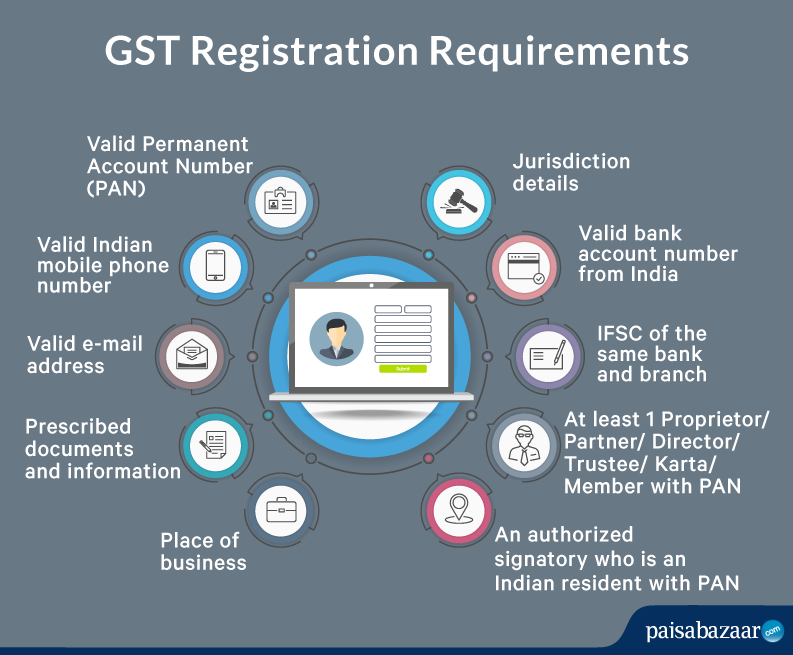The Ultimate Overview to Simplifying the GST Registration Refine and Needs for Small Service Owners

Comprehending GST Fundamentals
To understand the basics of the Goods and Services Tax (GST) system, small company owners must initially recognize its underlying concepts and ramifications. GST is a value-added tax levied on most items and solutions for domestic consumption. It aims to enhance the tax process by changing several indirect taxes imposed by the state and main federal governments. Under the GST regime, businesses are called for to accumulate and sign up tax obligation in support of the government, guaranteeing openness and conformity.
One of the key concepts of GST is input tax credit, which enables businesses to declare credit scores for taxes paid on their acquisitions. This mechanism protects against the cascading impact of tax obligations and promotes effectiveness in the tax system. Additionally, GST is a destination-based tax obligation, implying that the tax obligation is imposed at the factor of consumption as opposed to the factor of origin. This guarantees reasonable circulation of tax earnings among states based on where the services or products are eaten. Understanding these basic concepts is crucial for small company owners to navigate the complexities of the GST system and make sure compliance with the regulation.
Eligibility Criteria for Registration
Having established a fundamental understanding of GST principles, small company proprietors need to currently meet particular eligibility criteria to proceed with the enrollment process. In India, entities engaged in the supply of items or solutions with a yearly accumulation turnover exceeding Rs. 40 lakhs (Rs. 10 lakhs for special classification states) are needed to register for GST. Additionally, certain businesses such as those associated with inter-state supply of items, informal taxable persons, and those called for to pay tax obligation under the reverse charge mechanism have to sign up for GST irrespective of their turn over. In addition, services that were registered under the previous tax regimen (BARREL, service tax, and so on) are likewise mandated to register under GST. However, farming companies that only provide create out of primary manufacturing are exempt from GST enrollment. It is important for company proprietors to meticulously analyze their eligibility based on these standards to make sure conformity with the legislation and avoid any type of charges for non-compliance.
Files Needed for GST Enrollment

Simplified Registration Refine Actions
Adhering to the collection and confirmation of the requisite files, the enrollment process for GST can be navigated visit this web-site via a series of streamlined steps created to help with efficient conformity for small business proprietors. The first action includes seeing the GST site and selecting the 'New Enrollment' choice. Ultimately, the applicant has to fill out Part A of the GST REG-01 form with information such as PAN, mobile number, and e-mail address to obtain an OTP for verification. As soon as the OTP is gotten and gotten in, a Momentary Reference Number (TRN) is produced for additional proceedings. The next action requires filling in Part B of the kind with needed company information, posting sustaining documents, and finishing the verification procedure making use of DSC or EVC. Upon effective verification, an Application Recommendation Number (ARN) is released, indicating the completion of the GST registration procedure. By adhering to these simplified steps, local business owners can successfully sign up for GST and guarantee conformity with tax obligation regulations.
Tips for Ensuring Conformity
To preserve regulative adherence and operational integrity, diligent oversight and aggressive actions are crucial in ensuring conformity with GST demands for local business owners. Local business owners have to stay updated with GST regulations, submitting due dates, and any adjustments in tax prices to prevent penalties and keep an excellent standing with tax authorities. One essential pointer for compliance is to keep exact and comprehensive records of all purchases, including invoices, costs, and billings connected to GST. Consistently reconciling monetary records with GST returns can assist in recognizing and remedying any type review of inconsistencies promptly. In addition, performing routine internal audits or looking for specialist support can make certain that business is complying with all GST policies correctly. It is likewise crucial for small company proprietors to purchase GST-compliant audit software application that can enhance the tax declaring procedure and minimize errors. Participating in GST awareness workshops or training programs can enhance understanding and compliance with GST guidelines, inevitably benefiting the organization in the lengthy run.
Verdict
In conclusion, tiny organization proprietors should understand the basics of GST, fulfill the qualification criteria, gather essential records, and follow the streamlined registration process actions to make certain compliance. By streamlining the GST enrollment procedure and needs, little company owners can stay clear of charges and operate their services smoothly within the legal structure - Singapore GST Registration. It is vital for local business proprietors to stay certified and informed with GST laws to preserve an effective service operation
Little company proprietors seeking GST registration have to ensure they collect and submit the essential papers original site to finish the registration procedure effectively. The records needed for GST registration generally consist of proof of service enrollment or consolidation, FRYING PAN (Permanent Account Number) card of the service entity, address and identity proof of the promoters/partners/directors, photos, address evidence of the place of service, financial institution account statements or terminated cheques, and consent forms. Going to GST understanding workshops or training programs can improve understanding and compliance with GST policies, ultimately profiting the service in the long run.
By simplifying the GST registration process and requirements, tiny business owners can avoid charges and operate their services smoothly within the legal framework. It is crucial for small company proprietors to remain educated and compliant with GST regulations to keep an effective service operation.